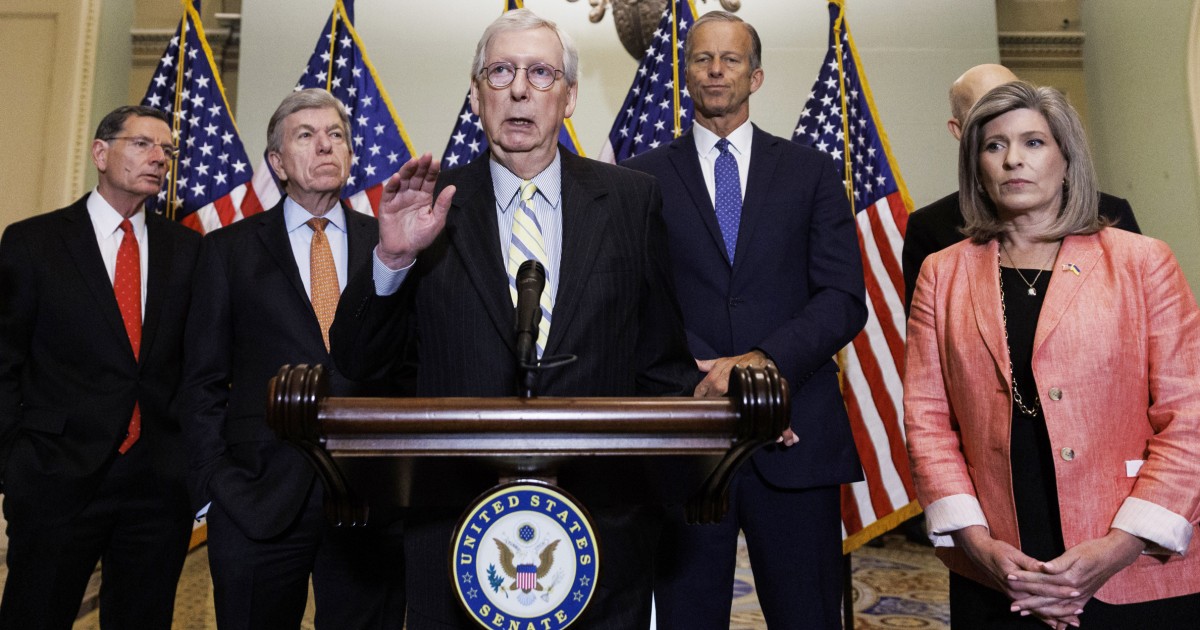
www.nbcnews.com
Republicans split on same-sex marriage bill, which faces uncertainty in the Senate
WASHINGTON — A bill to codify federal protections for same-sex marriage has passed the House, but Senate Republicans are agonizing over whether they should
Politics
WASHINGTON — A bill to codify federal protections for same-sex marriage has passed the House, but Senate Republicans are agonizing over whether they should block it or allow it to pass.
With Democrats seeking to portray Republicans as belonging to a retrograde and primitive party that wants to strip away modern rights, their decision could play a role in the midterm elections this fall.
Some GOP strategists want the party to move past the issue by codifying protections, but that risks upsetting the cultural conservatives, which make up a significant portion of the party's base. A Gallup poll released last month found that most Americans — 71 percent — favor legal same-sex marriage.
“The issue puts Republicans in an awkward spot," said Jack Pitney, a professor of political science at Claremont McKenna College. "Most Americans support same-sex marriage. Even a majority of self-identified Republicans support it. But evangelicals represent a huge share of GOP activists, and they still oppose it.
“More broadly, Republican activists dislike the idea of giving the Democrats a win — even on an issue where there is consensus in the general public,” he said.
For now, Democrats have locked down nearly half the Republican votes needed to break a 60-vote filibuster. With many GOP senators dismissing the bill as unnecessary and accusing Democrats of trying to weaponize an issue they say is settled, it's still unclear if the legislation will draw enough Republicans to become law.
Same-sex marriage remains legal. But the issue was reignited last month after the conservative-leaning court ended the right to abortion by overturning Roe v. Wade. In that decision, Justice Clarence Thomas, a conservative icon, called on the court to also reconsider nationwide rights to gay marriage and contraception.
The Respect for Marriage Act won 47 GOP votes in the House, including from self-described "ultra MAGA" Rep. Elise Stefanik of New York, and other conservative members. But 157 Republicans voted no, indicating the enduring power of a conservative base that feels threatened by the pace of cultural change.
In the Senate, the bill is co-sponsored by Republicans Susan Collins of Maine, a centrist, and Rob Portman of Ohio, who is retiring and has supported same-sex marriage since 2013, after his son told him he was gay.
Sen. Thom Tillis, a North Carolina Republican, would vote for the bill, his office told NBC News. And Sen. Ron Johnson, a Wisconsin Republican, who faces a challenging re-election race, reluctantly said he'd vote for the bill. “Even though I feel the Respect for Marriage Act is unnecessary, should it come before the Senate, I see no reason to oppose it," he said.
Sen. Lisa Murkowski, an Alaska Republican, said she’s still reviewing the Respect for Marriage Act but noted that she supports same-sex marriage.
But other Republicans, like Sen. Ted Cruz and John Cornyn, both of Texas, have sharply criticized the Supreme Court's decision that legalized same-sex marriage nationwide in the landmark Obergefell v. Hodges ruling in 2015. Cruz's office emphasized that he wasn't predicting it would be overturned.
Sen. Marco Rubio, a Florida Republican, who also faces re-election this fall, will vote against the bill, a Rubio spokesperson said, adding that he believes "it is unnecessary, there are other priorities, and this is an issue he’s always believed should be handled by the states."
























































